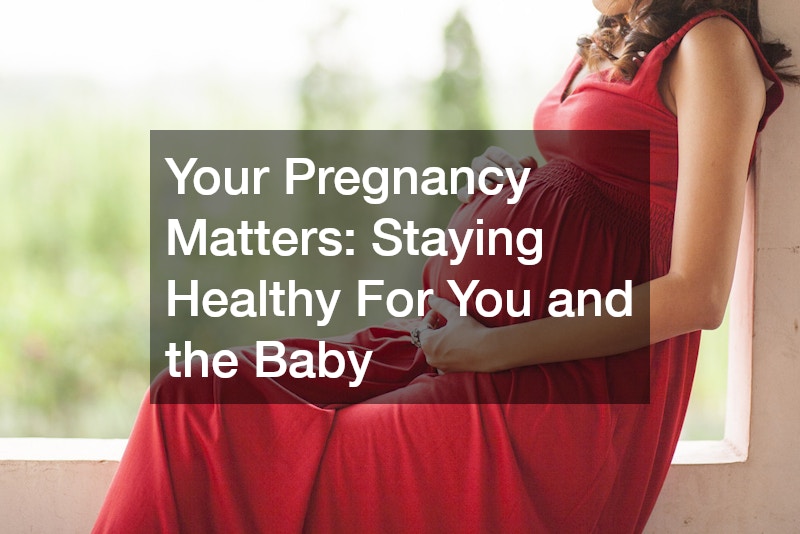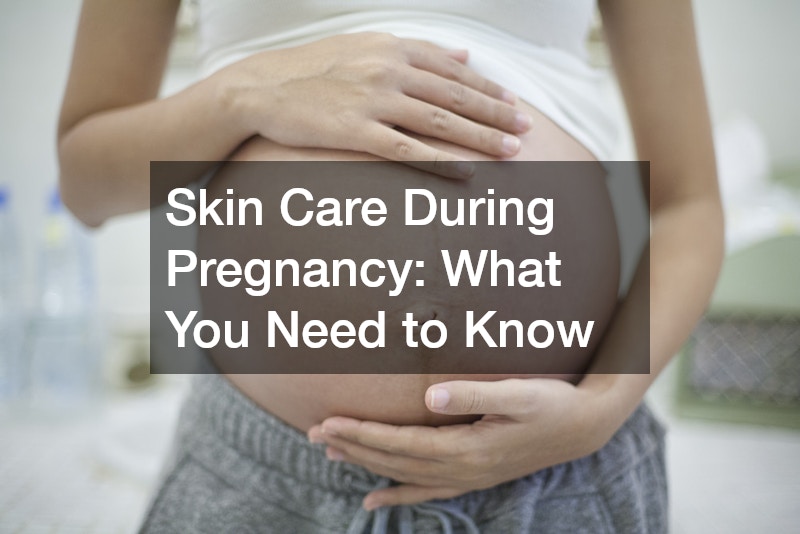

Pregnancy is one of the most profound and transformative experiences a woman can go through. The physical and emotional changes are vast, and the decisions you make during this time can significantly impact both your health and the health of your baby. Whether you’re a first-time mother or adding another child to your family, the journey of pregnancy matters immensely. It’s important to prioritize your health by staying informed, making smart choices, and seeking the right support systems. In this article, we’ll cover key areas that can help you stay healthy and keep your pregnancy on track.
The Importance of Nutrition During Pregnancy
When you’re pregnant, the food you consume not only affects you but also has a direct impact on your baby’s development. Ensuring that your diet includes a variety of essential nutrients will help your body perform at its best. Pregnancy matters because what you eat contributes to your baby’s growth, especially in terms of brain development, bone health, and overall wellness. Fresh food logistics play a key role in maintaining a balanced diet. Having access to fresh, high-quality produce ensures you’re getting the vitamins and minerals you need. Work with a nutritionist or use a meal-planning service to help you incorporate nutrient-dense meals into your daily routine.
Key nutrients for pregnancy include folate, calcium, iron, and omega-3 fatty acids. Folate, for example, helps prevent neural tube defects, while calcium supports the development of strong bones. Iron is vital for preventing anemia, which is common during pregnancy. Eating a variety of whole foods like fruits, vegetables, lean proteins, and whole grains is the best way to support both you and your baby. When you can, consider shopping at a local farmers market for fresh produce. It supports local farmers while ensuring that you’re getting the best possible ingredients for your meals.
Skin Care During Pregnancy: What You Need to Know
Pregnancy matters not just for your physical health but for your skin as well. The changes in hormones can affect your complexion, and taking care of your skin is essential for keeping it smooth, hydrated, and healthy throughout the months ahead. Your skin stretches as your baby grows, which can lead to dryness or the formation of stretch marks. Opting for a good skin care routine that focuses on moisturizing and protecting your skin is crucial. You might want to look for natural products to avoid harsh chemicals that could affect you or your baby.
In addition to using quality moisturizers, consider using a gentle sunscreen to protect your skin from harmful UV rays. Hormonal fluctuations can make your skin more sensitive, increasing the risk of sunburn. Some women experience a “pregnancy glow” due to the increased blood flow, while others struggle with acne or pigmentation. Consult with a dermatologist to find products tailored to your skin type and avoid over-the-counter medications that may not be safe during pregnancy.
Taking Care of Your Teeth: A Visit to the Dentist
Your dental health is another important aspect of maintaining your overall well-being while pregnant. Pregnancy matters not only for your overall health but for your oral health too. Hormonal changes during pregnancy can affect your gums and teeth. For example, you may experience swollen or bleeding gums, which is known as pregnancy gingivitis. This condition can increase the risk of tooth decay and gum disease if left untreated.
It’s important to maintain regular visits to the dentist during pregnancy, as they can help prevent any oral health issues from worsening. Dentists are able to provide cleanings and check-ups that can help keep your gums and teeth in good shape. If you’re planning to become a surrogate or are simply preparing for your own pregnancy, it’s crucial to establish a solid oral health routine early. Ensure that you brush twice a day, floss regularly, and avoid sugary snacks, which can lead to tooth decay. If you experience any discomfort or unusual symptoms, don’t hesitate to consult with your dentist.
Staying Active: Exercise and Physical Wellness
Staying active during pregnancy is a great way to maintain your physical health and prepare your body for labor and delivery. Moderate exercise can reduce stress, improve circulation, and help keep your weight in a healthy range. Pregnancy matters in the way you approach your fitness routine. Exercising during pregnancy can boost your energy levels, improve sleep, and reduce the risk of gestational diabetes. It’s always a good idea to consult with your doctor before starting any new fitness regimen, especially if you have preexisting conditions or concerns.
Simple exercises such as walking, swimming, and prenatal yoga are excellent choices for pregnant women. These activities are low-impact and can help strengthen your muscles while relieving pregnancy-related aches and pains. Joining a local childbirth class may also provide you with helpful tips and exercises that are specifically designed to prepare your body for labor. If you’re unfamiliar with local options, your healthcare provider can point you in the right direction for trusted programs.

Managing Weight Gain: Medical Weight Loss Programs
During pregnancy, weight gain is normal and expected, but it’s important to manage it in a healthy way. Pregnancy matters because the weight you gain will support your baby’s growth and ensure you have the necessary reserves for breastfeeding. However, excessive weight gain can lead to complications like gestational diabetes, hypertension, and an increased risk of cesarean delivery. Many women struggle with finding the right balance, especially if they have pre-pregnancy weight concerns.
If you’re concerned about your weight, you might consider a medical weight loss program. These programs are tailored to your unique health needs and can provide guidance on how to safely lose or maintain weight during pregnancy. A program can help you achieve steady, healthy weight gain through personalized meal plans, exercise routines, and stress management techniques. Your healthcare provider can recommend a program that aligns with your goals and ensures that both you and your baby stay healthy.
Keeping Track of Your Health: The Role of Medical Equipment
Staying on top of your health during pregnancy requires keeping track of various factors, from your blood pressure to your nutritional intake. Pregnancy matters in how well you monitor and manage these aspects. Medical equipment like a blood pressure cuff, glucose meter, and thermometer can be useful tools to help you keep track of your health at home. For example, home blood pressure monitoring can help detect early signs of preeclampsia, a serious condition that can arise during pregnancy.
If you’re managing any chronic health conditions, such as diabetes or hypertension, it’s especially important to have access to the right medical equipment. Speak to your doctor about what types of monitoring tools you may need. Many clinics also offer resources for expectant mothers, including access to medical equipment for home use. By staying proactive about your health, you can reduce the risk of complications and ensure a smoother pregnancy.

Water Filtration: A Must for Expecting Mothers
When it comes to pregnancy, hydration is key. Drinking enough water is essential for supporting your body as it works hard to grow and nourish your baby. However, it’s not just about the quantity of water, but also its quality. Water filtration plays an important role in ensuring that the water you drink is clean and free from harmful contaminants that could affect both you and your baby.
Most tap water is treated to meet safety standards, but some areas may still have issues with contaminants like lead or chlorine. Installing a water filtration system in your home can help remove these impurities and provide you with fresh, clean water. If you’re pregnant, this is particularly important, as the quality of the water you drink can directly impact your health and the development of your baby. Filtered water also has a better taste, making it easier for you to stay hydrated throughout the day.
Finding the Right Support System: Vascular Clinics and Medical Professionals
During pregnancy, it’s essential to have a solid support system in place to help you navigate the physical and emotional challenges. Pregnancy matters, and building a network of professionals and loved ones who are there to help can make all the difference. One key resource is a vascular clinic, which can help address circulation-related issues that may arise during pregnancy, such as varicose veins or deep vein thrombosis. These conditions can be exacerbated by the hormonal changes and increased blood flow that come with pregnancy.
A vascular clinic can provide treatments, recommendations for compression stockings, and exercises to support healthy blood flow. In addition to specialists like vascular doctors, it’s also important to have access to a wide range of healthcare professionals, such as OB-GYNs, midwives, nutritionists, and therapists. They can guide you through the various stages of pregnancy, answer your questions, and provide advice on managing your health.
Local Childbirth Classes: Preparing for Labor
As your pregnancy progresses, the excitement of meeting your baby grows, but so does the anticipation of labor and delivery. Pregnancy matters during this time because preparation is key to having a positive birth experience. One of the best ways to prepare for labor is by attending a local childbirth class. These classes are designed to educate expectant parents about what to expect during labor, delivery, and the postpartum period.
Local childbirth classes can provide you with valuable knowledge on breathing techniques, pain management options, and relaxation strategies that can help you feel more confident and in control when the time comes. You’ll also learn about the different stages of labor, the signs of preterm labor, and how to advocate for yourself in the hospital or birthing center. Attending a class can also give you the chance to connect with other expectant parents, building a sense of community and support during this transformative time.

The Role of Mental Health During Pregnancy
Pregnancy matters not only for your physical health but for your mental well-being as well. The changes your body undergoes, the emotional fluctuations that accompany them, and the anticipation of motherhood can all contribute to stress, anxiety, or even depression. Mental health during pregnancy is just as important as your physical health, and caring for your emotional state can improve the overall pregnancy experience. This means from medical billing to physical side effects, you need to be able to handle them with a support system.
Many women experience what is known as “pregnancy blues,” a temporary period of emotional vulnerability, which is generally due to hormone changes. However, for some, this can evolve into more severe forms of anxiety or depression, known as prenatal depression. It’s crucial to speak with a healthcare provider if you feel overwhelmed, sad, or anxious for extended periods. They can recommend therapies, counseling, or, if necessary, medications that are safe for pregnancy. Engaging in relaxation techniques such as mindfulness, meditation, and breathing exercises can also be helpful for reducing stress. Additionally, joining a local childbirth class or support group can provide a sense of community and reassurance during what can sometimes feel like an overwhelming time.
Postpartum Care: The Transition to New Motherhood
Pregnancy matters not only during the 40 weeks but also during the transition into motherhood. While much of the focus during pregnancy is on prenatal care, postpartum care is equally important. The period after birth is when your body begins to recover from the intense physical demands of pregnancy and delivery. It’s also when you’ll begin bonding with your baby and navigating the emotional changes that come with the postpartum period.
Your recovery after delivery will vary based on factors such as the type of delivery (vaginal or cesarean), your health before pregnancy, and how well you take care of yourself during this time. One important area of focus is your pelvic health, as pregnancy and childbirth can take a toll on the pelvic floor muscles. Many women benefit from pelvic floor physical therapy, which helps strengthen muscles and improve recovery after childbirth. Consulting a vascular clinic may also be useful if you experience circulation issues related to pregnancy, such as varicose veins, as some of these can persist post-delivery.
Conclusion: Your Pregnancy Matters
Throughout this journey, remember that pregnancy matters in every aspect of your life—from your physical health to your emotional well-being. Taking care of your body, seeking out the right resources, and maintaining a positive attitude can set you up for a healthy pregnancy and a safe delivery. Whether it’s managing your weight, nourishing your body with the right foods, or attending a local childbirth class, each decision you make has an impact on your pregnancy experience. By staying informed, seeking support, and prioritizing your health, you’ll give yourself and your baby the best chance for a bright and healthy future.



